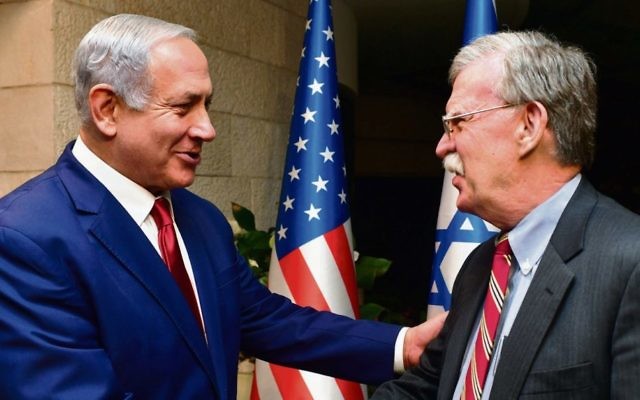US seeks to reassure Israel over Syria
After a fortnight of frenzy, Israel's security officials relaxed on Sunday, when America slowed the timetable for its pullout from Syria.
AFTER a fortnight of frenzy, Israel’s security officials relaxed on Sunday, when America slowed the timetable for its pullout from Syria.
On December 19, President Donald Trump abruptly said that America had defeated ISIS in Syria and “now it’s time for our troops to come back home”.
Given that Israel views the United States as the responsible adult in Syria, it was alarmed by the announcement.
But on Sunday, Trump’s national security adviser John Bolton said during a visit to Jerusalem that America won’t finish its withdrawal until ISIS is defeated.
This didn’t just call Trump’s earlier assessment into doubt, but also indicated that America could keep troops there for months or even years.
Trump echoed Bolton, saying in Washington, “We won’t be finally pulled out until ISIS is gone.”
A few days earlier, US Secretary of State Mike Pompeo had told Benjamin Netanyahu, during a meeting in Brazil, that “the decision by the president on Syria in no way changes anything that this administration is working on alongside Israel”.
To Israel’s disappointment the timeline for withdrawal wasn’t slowed during that meeting – but they got their wish from Bolton.
Now, the US isn’t only conditioning the withdrawal of its troops on the defeat of ISIS, but also on ensuring the safety of Kurdish fighters who have allied themselves with the US, another factor that could slow the withdrawal.
Bolton said in Jerusalem that America will “make sure that the defence of Israel and our other friends in the region is absolutely assured”.
There were smiles and firm handshakes all around, and Netanyahu-Bolton talks in Jerusalem were followed by a joint trip to the Golan Heights, by the Syria border.
But while the reassurances allowed the Israeli security establishment to relax a little, it is still uneasy, because there’s a very basic disconnect between the Syria discussion in Washington and in Jerusalem.
Trump has made the Syria discussion all about ISIS. His message is that America was there to counter ISIS, and with this job done or nearly done (his assessment seems to vary) should be leaving or at least preparing to leave.
Yet for Israel, the big benefit of having America on the ground in Syria was never its role against ISIS but rather its ability to keep Iran in check.
The headache of the Syrian Civil War, for Israeli officials, has been all about the massive power and influence that the Iranians have in Syria after years propping up the Syrian regime.
In Jerusalem, Bolton said that Netanyahu’s analysis of threats in the region is accurate, spoke about Iran’s presence in Syria and its “belligerent military activity”, and said that “all of these threats in the region are also global threats”.
He said there will be “a different environment after we leave, there is no question about that”. He added, “But there is no desire to see Iran’s influence spread, that’s for sure.”
He also suggested that US troops may remain in the future in a spot in southern Syria where they counter Iranian influence.
Bolton’s words were reassuring to Israelis – but the reality is that in Washington, the issues which will determine how long troops stay in Syria are ISIS and the Kurds.
However much Bolton talked about Iran when he was in Israel, back home it’s not the big issue determining Syria policy. Yet this Iran issue is more or less all that really matters to Israel.
And this is why, despite all that Bolton had to say in Jerusalem, and despite Israeli officials being left less panicked now that a full withdrawal isn’t imminent, they are still watching the situation with a sense of foreboding.
NATHAN JEFFAY


comments